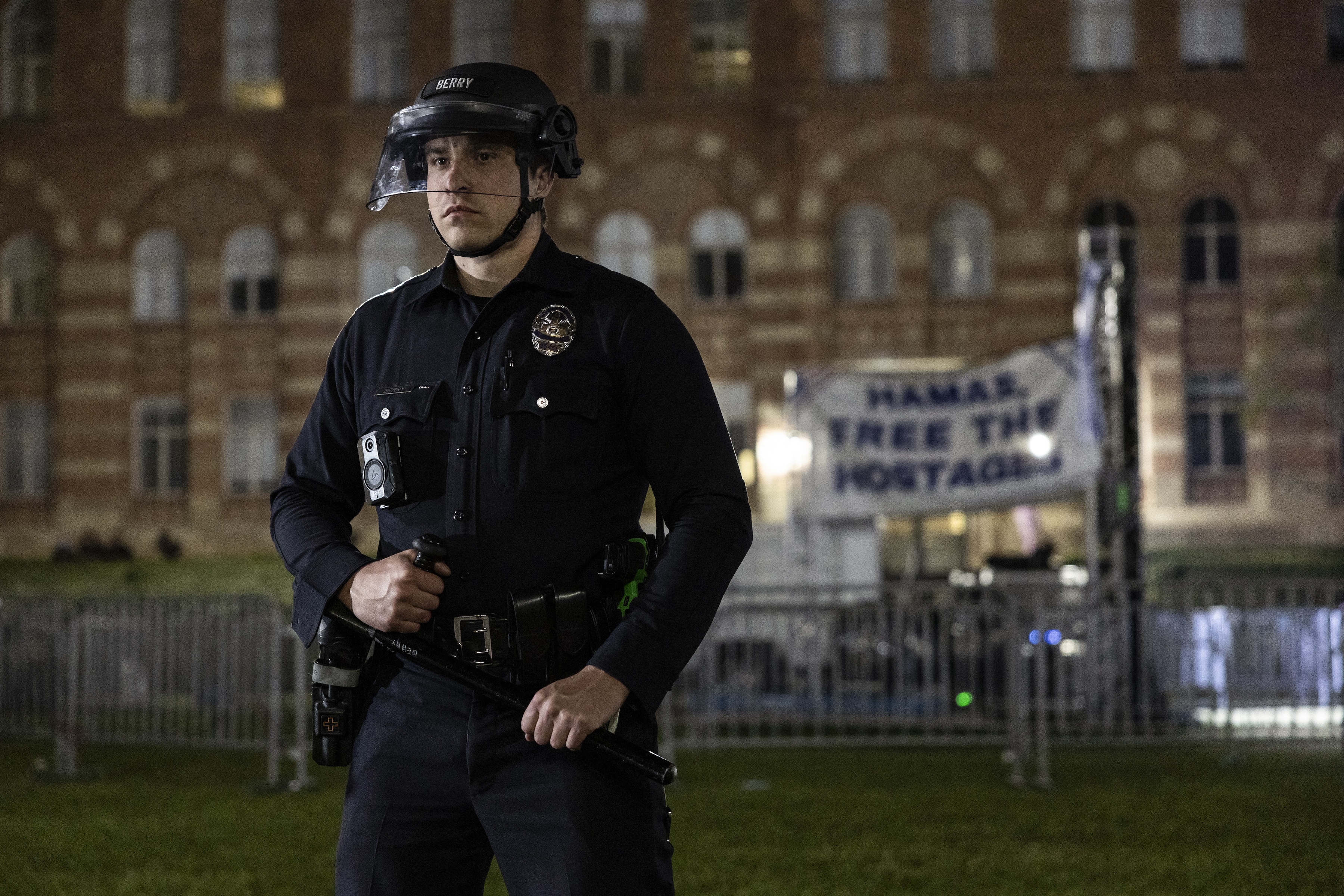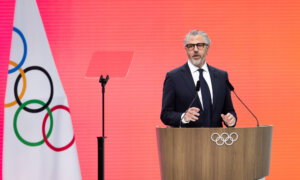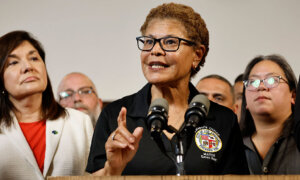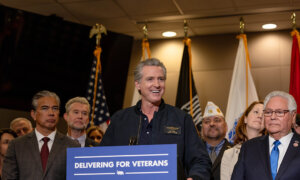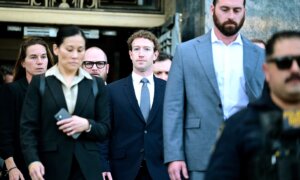The union that represents campus police officers at the 10 University of California schools is blaming UCLA administrators for the much-criticized response to violence that broke out at the Westwood campus this week.
Federated University Police Officer’s Association said May 4 that the upcoming probe by UC President Michael Drake into the university’s “planning, actions and response by law enforcement” must consider the university’s own guidelines for response to campus protests.
“The written guidelines for roles and responsibilities make clear that senior UC administrators on each campus are solely responsible for the University’s response to campus protests; those administrators decide the objective, and campus police are only responsible for tactics in implementing those objectives,” the union’s President Wade Stern said.
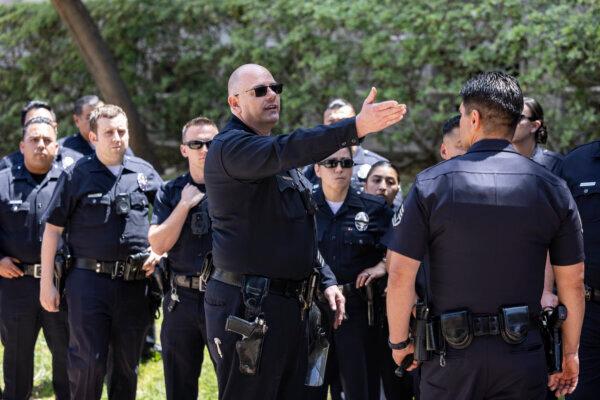
Police officers are deployed near a pro-Palestinian protest encampment on the campus of the University of California, Los Angeles (UCLA) in Los Angeles, on May 1, 2024. (Etienne Laurent/AFP via Getty)
“As such, the UCLA administration owns all the fallout from the response and lack of response to this protest.”
Police moved in and cleared a week-long pro-Palestinian encampment early Thursday, arresting 209 people. Most of those arrested were booked on suspicion of unlawful assembly, then released from custody with instructions to appear in court at a later date.
Los Angeles County Public Defender Ricardo Garcia said his office is committed to providing all arrestees representation and support.
“At this time, we do not have information on what, if any, charges will be presented,” he said. “Nonetheless, it is essential that due process and the presumption of innocence are upheld. We will work diligently to protect the rights of our clients throughout.”
No significant injuries to protesters or the hundreds of police officers who took part in the raid were reported.
The raid came after the situation peaked overnight Tuesday and early Wednesday, when the pro-Palestinian encampment was attacked by counter-protesters supporting Israel who set off fireworks and allegedly deployed pepper spray or bear repellent. The violence prompted the cancellation of all classes at UCLA on Wednesday.
“We approached the encampment with the goal of maximizing our community members’ ability to make their voices heard on an urgent global issue,” UCLA Chancellor Gene Block said in a statement Thursday afternoon. “We had allowed it to remain in place so long as it did not jeopardize Bruins’ safety or harm our ability to carry out our mission.
“But while many of the protesters at the encampment remained peaceful, ultimately, the site became a focal point for serious violence as well as a huge disruption to our campus. Several days of violent clashes between demonstrators and counter-demonstrators put too many Bruins in harm’s way and created an environment that was completely unsafe for learning.”
Mr. Block said roughly 300 people who had been inside the campus left the area voluntarily before the mass arrests began.
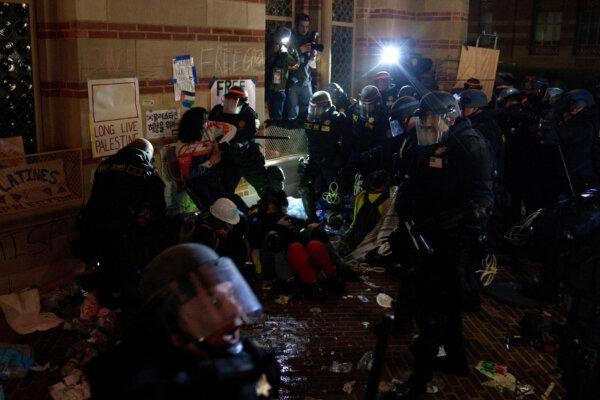
Members of law enforcement enter a Pro-Palestinian encampment at UCLA in Los Angeles on May 2, 2024. (Eric Thayer/Getty Images)
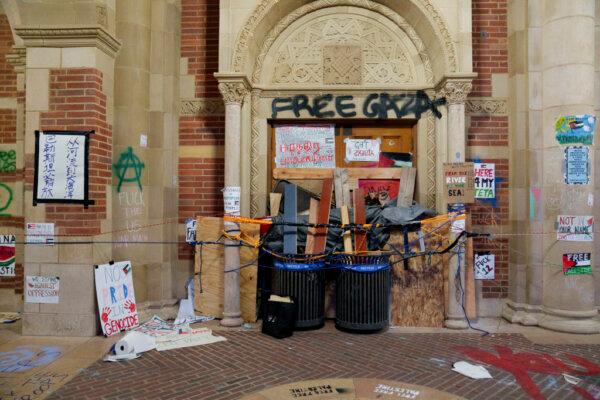
A barricaded door in a pro-Palestine encampment at UCLA in Los Angeles on May 1, 2024. (Eric Thayer/Getty Images)
The clearing of the encampment, however, gave a broader picture of the amount of damage done to the campus. The front of Royce Hall and Powell Library suffered extensive graffiti damage, some of it profane. Piles of garbage were also left behind in the former encampment area.
Cleanup crews moved into the area Thursday morning, and made relatively quick work of the garbage removal. The graffiti removal was likely to take much longer.
Campus security was also maintaining a presence on the campus, amid fears that protesters might return to the scene and try to re-establish the encampment.
Mayor Karen Bass issued a statement around midday Thursday defending the decision to clear the encampment.
“Every student deserves to be safe and live peacefully on their campus,” she said. “Harassment, vandalism, and violence have no place at UCLA or anywhere in our city. My office will continue to coordinate closely with local and state law enforcement, area universities, and community leaders to keep campuses safe and peaceful.”
Investigations are still pending about the university’s response to the protest and some of the violent clashes that occurred.
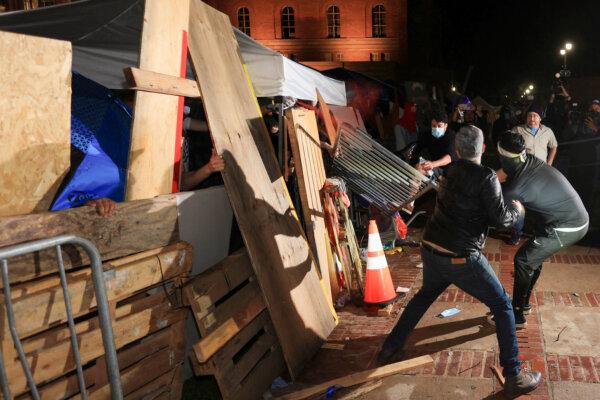
Counter-protesters strike a barricade at a pro-Palestinian encampment on the University of California, Los Angeles campus, amid the ongoing Israel-Hamas conflict, in Los Angeles on May 1, 2024. (Reuters/David Swanson)
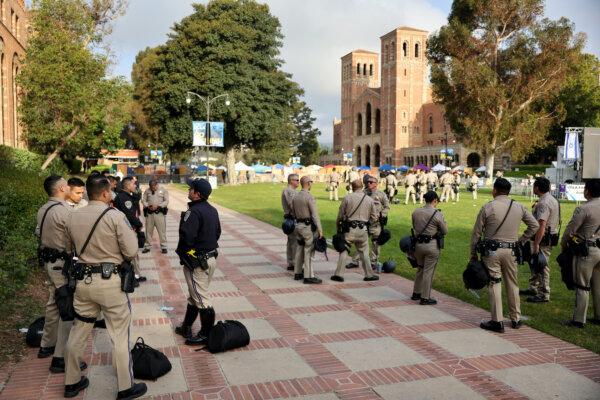
California Highway Patrol (CHP) officers keep watch at a pro-Palestinian encampment, the morning after it was attacked by counter-protestors at the University of California, Los Angeles (UCLA) campus in Los Angeles, Calif., on May 1, 2024. (Mario Tama/Getty Images)
Gov. Gavin Newsom and other elected officials called for investigations into the university and police response. Observers said the Tuesday night attack was allowed to rage for several hours with little to no police intervention, until officers in riot gear finally moved in around 3 a.m. and restored order.
In a message to the UCLA community Wednesday afternoon, Chancellor Block called the overnight clashes the result of “instigators” who came to the campus to “forcefully attack the encampment.”
But the governor’s office called the “limited and delayed campus law enforcement response ... unacceptable.”
Dr. Drake, president of the University of California, issued a statement Wednesday saying he has “requested a detailed accounting from the campus about what transpired in the early morning hours [Wednesday].”
“But some confusion remains. Therefore, we are also ordering an independent external review of both UCLA’s planning and actions, and the effectiveness of the mutual aid response. Such a review will help us address many immediate questions but also help guide us in possible future events.”
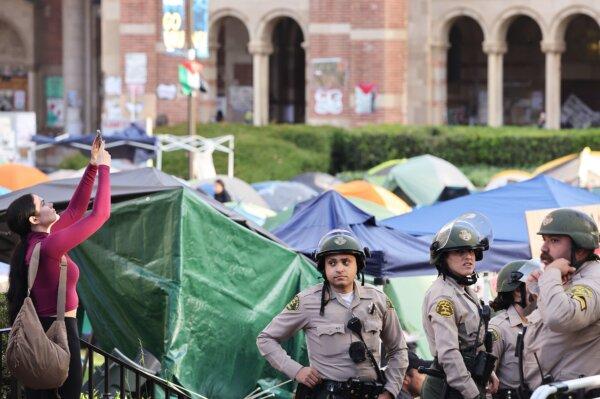
Los Angeles County Sheriff’s deputies keep watch near a pro-Palestinian encampment, the morning after it was attacked by counter-protestors at the University of California, Los Angeles campus, on May 1, 2024. (Mario Tama/Getty Images)
The UC Board of Regents was holding a special closed-door meeting for Friday to discuss campus encampments and the university system’s response.
Mr. Stern, president of the police union, said some of the questions that the independent probe should answer should include the following:
- Have UCLA administrators undergone the mandated annual formal training in crowd management, mediation, de-escalation techniques, the Incident Command System, and police force options?
- Were simulations to rehearse response to civil disobedience scenarios conducted between campus administrators and UCLA campus police as required by the guidelines?
- Did UCLA administrators implement the required regular program for joint training, briefings, and scenario planning with law enforcement agencies on which UCLA police were likely to call for assistance or mutual aid implemented?
- Was a delayed response by outside agencies caused by the failure of UCLA administrators to have a written response plan for the outside agencies to refer to in making their response?
- Did UCLA administrators direct UC police to “stand down and stand aside” as students on campus were “repeatedly attacked and harassed by protesters before the encampment was cleared?”
Organizers of the UCLA Palestine Solidarity Encampment, similar to their counterparts at USC, had issued a list of demands last week calling for divestment of all University of California and UCLA Foundation funds from companies tied to Israel, along with a demand that the university call for an immediate and permanent ceasefire in the Israel-Hamas war and begin an academic boycott against Israeli universities, including a suspension of study-abroad programs.
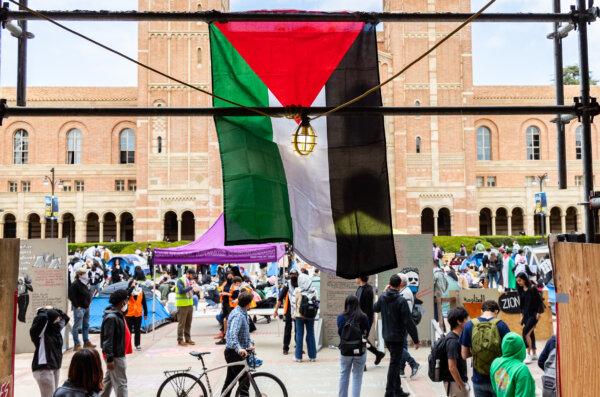
UCLA students protest the Israel-Hamas conflict, on the UCLA campus in Los Angeles on April 25, 2024. (John Fredricks/The Epoch Times)
The UC issued a statement in response noting that the university has “consistently opposed calls for boycott against and divestment from Israel. While the university affirms the right of our community members to express diverse viewpoints, a boycott of this sort impinges on the academic freedom of our students and faculty and the unfettered exchange of ideas on our campuses.
“UC tuition and fees are the primary funding sources for the University’s core operations. None of these funds are used for investment purposes,” the statement continued.
Mr. Block, who is stepping down as chancellor at the end of July, is expected to testify before Congress on May 23 about the campus’ response to antisemitism and actions to protect Jewish students.







